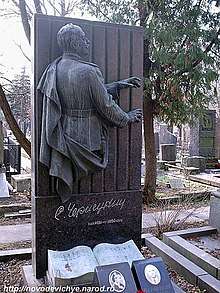Semyon Tchernetsky
Major General Semyon Alexanderovich Tchernetsky (Russian:Семё́н Алекса́ндрович Черне́цкий) was a Soviet military conductor and the founder of modern Russian military bands. He served as the Senior Director of the Central Military Band of the People's Commissariat of National Defense of the USSR from 1924 to 1950.
Major General Semyon Tchernetsky | |
|---|---|
 A monument to Tchernetsky at Novodevichy Cemetery in Moscow. | |
| Native name | Семё́н Черне́цкий |
| Born | October 24, 1881 Odessa, Kherson Governorate, Russian Empire |
| Died | April 13, 1950 (aged 68) Moscow, RSFSR, Soviet Union |
| Buried | |
| Allegiance | |
| Service/ | Red Army |
| Years of service | 1924-1949 |
| Rank | Major General |
| Commands held | Central Military Orchestra of the People's Commissariat of National Defense |
Early life and career
Tchernetsky was born on October 24, 1881 in Odessa to a musical family. From 1892-1893, Tchernetsky studied the trombone in the orchestra of the 24th Dragoon Lubny Regiment in Chisinau, where his uncle was the conductor. In 1911 he entered the St. Petersburg Conservatory, which he graduated in 1917. In 1918 Chernetsky joined the Red Army and was appointed as the head of the military bands of the Petrograd military district. He quickly rose through the ranks, eventually being appointed as the director of the Military Band of the Workers and Peasants Red Army in 1924. After more than 10 years in this position, he formed the Central Military Band of the People's Commissariat of National Defense, which later became the first military band to be formed in modern Russia. In 1935, together with professor Heinrich Neuhaus at the Moscow Conservatory, he created the Military Faculty of the Moscow State Conservatory, where music students get a curriculum based on the conducting and combat repertoire. On 1 August 1937, Cherneysky founded the Moscow Military Music College as a means of building and enhancing the knowledge of potential military musicians in the Red Army.[1] On June 24, 1945, Tchernetsky led the massed bands during the Moscow Victory Parade of 1945 on Red Square.
In 1946, he suffered from a paralysis, which resulted in his retirement from active service after 25 years in the armed forces. Tchernetsky died on April 13, 1950 in Moscow. He is buried at Novodevichy Cemetery.[2][3][4][5][6]
Legacy
Tchernetsky is highly regarded in the Russian military music sphere and one of the most outstanding Russian military composers in the 20th century. Depending on sources, he wrote between 100-200 marches, patriotic songs and other works in his lifetime. In addition to military marches, he also wrote some socio-political ones such as Glory to the Motherland, Lenin's Call and the March of Moscow Pioneers. Many of his military marches are the most famous and common ones used by the Russian Military Band Service, some of which have been used Moscow Victory Day Parade on Red Square for decades.
Compositions
Marches[7]
- Lenin's Call (1924-1936)
- Industrial March (1932)
- GTO (1933)
- Birobidzhan March (1934)
- Slow March of Military Academies of RKKA (1936)
- Slow March (1936)
- Slow March of Red Army (1936)
- Moscow Pioneers March (1936)
- Cossack March (1936)
- Georgian March (1936)
- Red Banner Komsomol March (1936)
- Ukrainian March No. 1 (1936)
- Ukrainian March No. 2 (1936)
- Ukrainian March No. 3 (1936 or 1938)
- Georgian Column March (1937)
- Youth March (1937)
- Cavalry Trot (1938)
- Red Banner Ensemble (1937)[8]
- March "Our Homeland (1938)
- March "Under the Flag of the People's Commissar" (1938)
- Friendship of the peoples of the USSR (1939)
- Parade March (1940)
- Solemn March (in honor of 20th anniversary of the Russian Cavalry Corps)
- Moldavian March (1940)
- Bessarabian March (1940)[9]
- Anatoly Krokhalev (1940)
- Victory Triumph (1940)
- Slow March of the Officer Schools (1941)
- March of the 1st Rifle Guards Division (1941)[10]
- March "Victory is Behind Us" (1941)
- Slow March of the First Guards Cavalry Corps (1942)
- Slow March of the Second Guards Cavalry Corps (1942)
- Slow March of the Third Guards Cavalry Corps (1942)
- March of the 8th Guards Motor Rifle "Panfilov" Division (1942)[11]
- Slavic March (1942)
- Fanfare March of Guard Divisions (1942)
- March of the First Guards Rifle Division (1942)
- For a Just Cause (1942)
- Hero of Stalingrad (1943)
- Hero of Azerbaijan (1943)
- Jubilee Slow March "25 Years of the Red Army" (1943)
- March of the Tankists (1943)
- March of the Guards Mortarmen (1943)
- March of the Leningrad Guards Rifle Divisions (1944)
- Native Donbass (1944)
- March of the 53rd Rifle Guards Division (1944)
- Salute to Moscow (1944)
- Victory March (fanfare) (1944)
- The Red Army's Entry into Bucharest (1944)
- The Red Army's Entry into Budapest (1945)
- Victory Holiday March (1946)
- Russian March (1945)
- Slow March of the Artillery March (1946)
- Slow March of the Tankists (1946)
- March of the Artillery (1946)
- March of Guards Artillery (1946)
Awards
- Honored Artist of the RSFSR (1936)
- Stalin Prize (1946)
- Order of Lenin
- Order of the Red Banner
- Order of the Patriotic War
- Order of the Red Star
- Medal "20 Years of the Red Army" (1938)
References
- "Московское военно-музыкальное училище". www.sovinformburo.com. Retrieved 2017-07-28.
- http://yiddishmusic.jewniverse.info/chernetskysemen/index.html
- http://www.jewmil.com/biografii/item/518-chernetskij-semen-aleksandrovich
- http://www.rgali.ru/object/10908107#!page:1/o:10908107/p:1
- http://rgali.ru/object/11044794#!page:1/o:11044794/p:1
- http://www.sovmusic.ru/person.php?idperson=48
- A list of works by Tchernetsky (Russian)
- "Краснознаменному ансамблю, попурри" (in Russian). Мир русской грамзаписи. The World of Russian Records. Retrieved 2016-03-30.
- "Бессарабский марш (Советская Молдавия)" (in Russian). Мир русской грамзаписи. The World of Russian Records. Retrieved 2016-03-31.
- Марш 1-й стрелковой гвардейской дивизии
- General Semyon Tchernetsky. March of the 8th Guards Panfilov Division Archived 2 April 2012 at the Wayback Machine. Composed 1945.